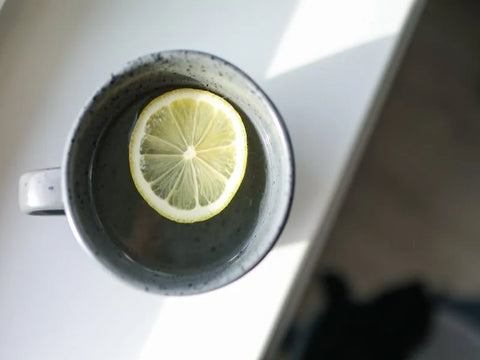For many people, starting the day with a hot cup of coffee is a ritual. However, this beloved beverage may be causing more harm than good for your teeth. The dark pigments in coffee can leave unsightly stains on your teeth, making you self-conscious about your smile. But fear not, there are several ways to remove coffee stains and maintain a bright smile.
Why Do Coffee Stains Teeth?
Coffee contains tannins, which are organic compounds that give the drink its dark color. These tannins can easily adhere to the enamel of your teeth, causing discoloration. Additionally, the acidity of coffee can erode the enamel, making it more susceptible to staining.
How to Prevent Coffee Stains on Teeth?
The best way to prevent coffee stains on teeth is to limit your intake of the beverage. However, for many coffee lovers, this may not be an option. Instead, try drinking through a straw to minimize contact with your teeth. You can also rinse your mouth with water after drinking coffee to wash away any residue that may cause staining.
Read: 3 Ways To Prevent Teeth Coffee-Stains
What Are the Best Ways to Remove Coffee Stains on Teeth?

- Brushing Your Teeth Immediately After Drinking Coffee: This helps to remove any coffee residue before it has a chance to stain your teeth.
- Using Whitening Toothpaste: Choose a toothpaste specifically designed to remove stains and whiten teeth.
- Oil Pulling with Coconut Oil: Swishing coconut oil in your mouth for 10-15 minutes can help remove stains and promote overall oral health.
- Drinking Water with Lemon: The citric acid in lemon can help remove stains, but be sure to rinse your mouth with water afterward to protect your tooth enamel.
- Professional Teeth Whitening: For more stubborn stains, a professional teeth whitening treatment from your dentist may be the most effective option.
Are There Any Natural Remedies for Removing Coffee Stains on Teeth?
- Baking Soda and Hydrogen Peroxide Paste: Mix equal parts baking soda and hydrogen peroxide to create a paste, and use it as a natural whitening treatment.
- Activated Charcoal: The abrasiveness of activated charcoal can help remove stains from your teeth.
How Can You Prevent Coffee Stains from Reoccurring on Teeth?
In addition to the prevention methods mentioned above, regular dental cleanings can help remove any surface stains and keep your teeth looking bright.
Conclusion:
While it's important to take care of your teeth and prevent coffee stains, it's also okay to enjoy your beloved beverage. By incorporating these tips into your routine, you can maintain a bright smile while still enjoying your coffee.
Key Takeaways:
Why Do Coffee Stains Teeth?
Coffee is known to stain teeth because of its high levels of tannins and acidity, which can easily penetrate the enamel. These tannins are responsible for the color of coffee and when combined with its acidic nature, they create the perfect formula for teeth staining.
How to Prevent Coffee Stains on Teeth?
- Brushing and Flossing: After drinking coffee, make sure to brush and floss to remove any residue that could potentially lead to stains.
- Use a Straw: When enjoying your coffee, consider using a straw to minimize direct contact with your teeth.
- Rinse Your Mouth: After consuming coffee, rinse your mouth with water to reduce the chances of stains.
To prevent coffee stains on your teeth, it is recommended to use a whitening toothpaste and regularly visit your dentist for professional cleanings.
What Are Some Alternatives to Drinking Coffee?
What Are Some Alternatives to Drinking Coffee? There are numerous options to coffee that can offer a comparable energy boost and taste. Some alternatives include:
- Tea: With varieties such as black, green, or herbal, tea provides a range of flavors and levels of caffeine.
- Yerba Mate: This South American beverage supplies a natural energy boost and contains beneficial antioxidants.
- Chicory Coffee: Created from roasted chicory root, it serves as a caffeine-free alternative to coffee with a similar flavor.
- Golden Milk: This drink, made with turmeric, offers anti-inflammatory benefits and a distinct taste.
What Are the Best Ways to Remove Coffee Stains on Teeth?
For many people, a cup of coffee is an essential part of their daily routine. However, this beloved beverage can also leave behind unsightly stains on our teeth. In this section, we will discuss the most effective methods for removing coffee stains from teeth. From simple at-home techniques like brushing your teeth right after drinking coffee to more advanced options like professional teeth whitening, we will cover all the best ways to keep your smile bright and coffee stain-free.1. Brushing Your Teeth Immediately After Drinking Coffee
- Rinse your mouth with water immediately after drinking coffee to minimize the staining effect on your teeth.
- Wait for 30 minutes before brushing to prevent damage to your enamel caused by the acidity of coffee.
- Incorporate a whitening toothpaste into your oral hygiene routine to help remove surface stains.
By following these steps, you can reduce the impact of coffee stains on your teeth while also maintaining good dental health.
2. Using Whitening Toothpaste
- When looking for a whitening toothpaste, opt for one with gentle abrasives that can effectively remove surface stains.
- Make sure to brush your teeth twice a day, for at least two minutes each time, with the chosen whitening toothpaste.
- Check the ingredients and make sure the toothpaste contains either hydrogen peroxide or carbamide peroxide, which can help lighten the color of your teeth.
After consistently using whitening toothpaste for a month, Sarah noticed a significant reduction in coffee stains on her teeth, giving her the confidence to smile during social gatherings.
3. Oil Pulling with Coconut Oil
- Take 1 tablespoon of coconut oil and place it in your mouth.
- Swish the oil around for 15-20 minutes.
- Spit out the oil and rinse your mouth with water.
- Brush your teeth as usual.
To effectively practice oil pulling with coconut oil, make sure not to swallow the oil as it may contain toxins.
4. Drinking Water with Lemon
- Squeeze half a lemon into a glass of water.
- Drink the lemon water before or after consuming coffee.
- Rinse your mouth with plain water afterward to prevent the acidity from affecting tooth enamel.
Pro-tip: To protect tooth enamel, limit the frequency of consuming acidic drinks like lemon water.
5. Professional Teeth Whitening
- Consultation: Schedule an appointment with a dental professional for an initial assessment of your teeth.
- Procedure: Undergo the recommended professional teeth whitening treatment.
- Follow-up Care: Adhere to any post-treatment instructions provided by the dentist to maintain the effects of the professional teeth whitening.
Are There Any Natural Remedies for Removing Coffee Stains on Teeth?
For many coffee lovers, the struggle to maintain a bright smile can be all too real. While professional teeth whitening treatments are effective, they can also be expensive. So, are there any natural remedies for removing coffee stains on teeth? In this section, we will discuss two popular options: creating a baking soda and hydrogen peroxide paste, and using activated charcoal. These alternatives to professional treatments may help diminish coffee stains and keep your pearly whites shining.1. Baking Soda and Hydrogen Peroxide Paste
To create a paste for removing coffee stains on teeth using baking soda and hydrogen peroxide, follow these steps:
- Combine 1 tablespoon of baking soda with 2 tablespoons of hydrogen peroxide to form a paste.
- Apply the paste to your teeth using a toothbrush or your finger.
- After leaving the paste on for 1-2 minutes, thoroughly rinse your mouth.
- Use this paste no more than once a week to prevent damaging tooth enamel.
A consistent use of this paste by a friend resulted in the removal of coffee stains, resulting in a brighter smile and increased confidence.
2. Activated Charcoal
- Activated charcoal, when used for teeth whitening, requires dipping a wet toothbrush into powdered charcoal and brushing for 2 minutes before rinsing thoroughly.
- After use, brush teeth with regular toothpaste to remove any remaining charcoal residue, repeating this process once daily for 1-2 weeks.
- To prevent enamel wear, it is important to limit the use of activated charcoal due to its abrasive nature.
For a gentler alternative, consider using whitening toothpaste that contains low-abrasive silica.
How Can You Prevent Coffee Stains from Reoccurring on Teeth?

1. Drinking Through a Straw
Using a straw while drinking your coffee can help reduce direct contact between the beverage and your teeth, thus minimizing the risk of staining. Here are the steps for drinking through a straw:
- Choose a reusable straw made of stainless steel, glass, or silicone for sustainability.
- Position the straw towards the back of your mouth to limit coffee exposure to your teeth.
- After use, make sure to thoroughly clean the straw to maintain good oral hygiene.
One of my friends started using a straw for her morning coffee and noticed a significant reduction in teeth staining after just a few weeks.
2. Rinsing Your Mouth with Water After Drinking Coffee
- Rinse with water immediately after drinking coffee to remove some staining substances.
- Swish water in your mouth thoroughly to wash away coffee particles and residue.
- Use a straw when drinking coffee to minimize direct contact with teeth.
Consider consulting a dentist for personalized recommendations on preventing coffee stains while enjoying your favorite beverage.
3. Regular Dental Cleanings
- Schedule regular dental cleanings every six months to remove coffee stains and prevent tartar buildup.
- During the cleaning, the dentist will polish your teeth to remove surface stains caused by coffee consumption.
- Regular dental check-ups provide an opportunity to discuss any concerns about coffee stains and explore whitening options.
Frequently Asked Questions
Can coffee stain teeth permanently?
Coffee stains on teeth are not permanent. With proper care and proactive steps, they can be removed and prevent future staining.
What are the leading culprits for tooth staining?
Coffee, tea, wine, and soda are some of the leading culprits for tooth staining due to their high pigmented molecules.
What are the six proven methods for removing coffee stains from teeth?
The six proven methods are using a straw, rinsing with water, waiting to brush, using baking soda, oil pulling, activated charcoal, and professional teeth whitening treatments.
How do dental professionals help in removing coffee stains from teeth?
Dental professionals can provide professional care such as cleaning and bleaching treatment, as well as offer teeth whitening kits for at-home use.
Can special ingredients like hydrogen peroxide and baking soda help in removing coffee stains?
Yes, a mixture of hydrogen peroxide and baking soda can be effective in removing coffee stains due to their ability to break down staining compounds on the enamel surface.
Is it safe to use teeth whitening strips for removing coffee stains?
Teeth whitening strips can be applied directly to the teeth and contain special abrasives that can neutralize acids and remove deep set stains. However, it is important to follow instructions carefully and consult a dental professional if necessary.


